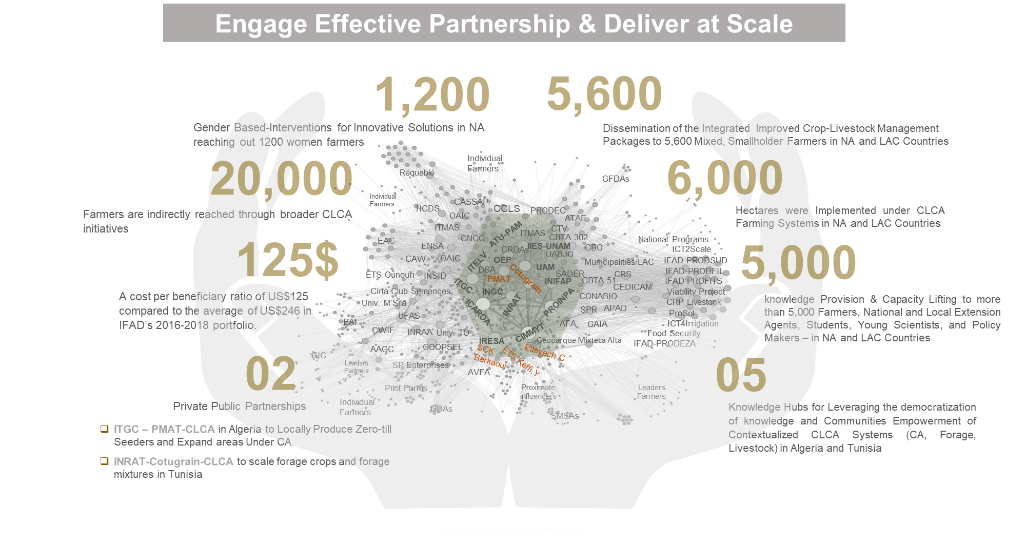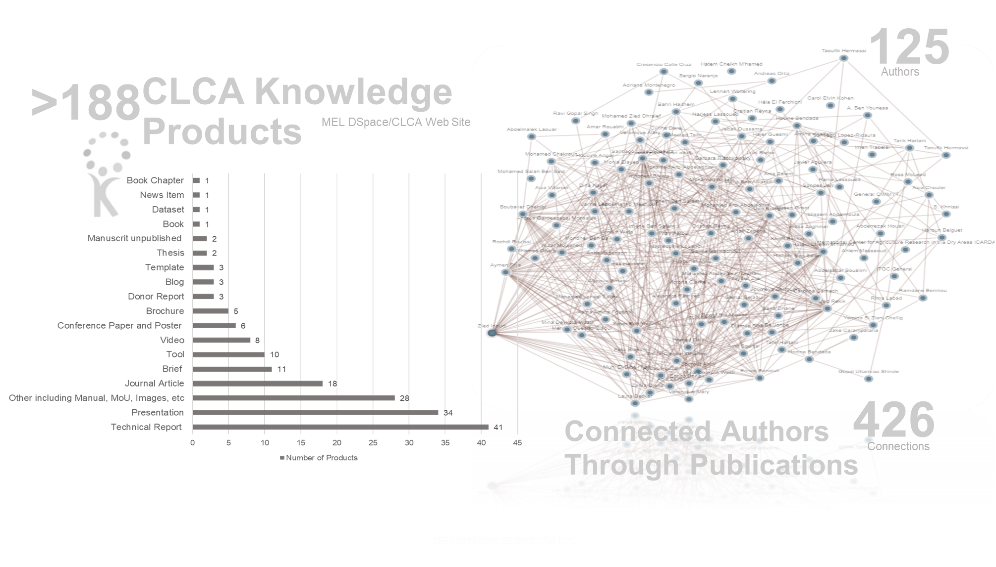Securing a legacy for the IFAD Conservation Agriculture and Crop Livestock Project

The Conservation Agriculture and Crop-livestock (CLCA) project was made possible through the financial support of the International Fund for Agricultural Development (IFAD) and the collaboration of Institut National de la Recherche Agronomique de Tunisie (INRAT), Institut Technique des Grandes Cultures (ITGC), Institut National des Grandes Cultures (INGC), Institut Technique de l’Elevage (ITELV), Office de l’Elevage et des Pâturages (OEP), and CIMMYT.
A recent closing workshop for the IFAD-funded Conservation Agriculture and Crop Livestock Project (CLCA) workshop highlighted innovative livestock and crop management tools and technologies that farmers in Algeria and Tunisia can now apply to optimize climate-resilient and integrated crop-livestock systems under conservation agriculture.
13 - 15 June 2022, Algeria: In collaboration with the Algerian Institut Technique des Grandes Cultures (ITGC), ICARDA hosted a three-day closing workshop for the IFAD-funded project “Use of Conservation Agriculture in Crop-Livestock Systems (CLCA) in the Drylands for Enhanced Water-Use Efficiency, Soil Fertility and Productivity in NA and LAC Countries.”
Held in Setif, Algeria, the workshop was attended by representatives of the National Agricultural Chamber of Algeria, alongside the Director Generals of all implementing and strategic partner institutions, and their research and development teams.
Professor Mondher Ben Salem, Director General of Tunisia's National Institute of Agronomic Research (INRAT)
The CLCA project offers smallholder farmers in Algeria and Tunisia a set of innovative and flexible livestock and crop management technologies to optimize climate-resilient and integrated crop-livestock systems under conservation agriculture, addressing the needs of their livestock and the environment.
The packages include biomass provision and inclusion of forages to increase forage production and diversify rotation systems, improved crop management practices to boost yield and productivity, and smart agricultural practices like no-till and minimal soil disturbance to help restore soil health and fertility.

The initiative has also given farmers more options to save scarce water resources, , provided access to more dual-purpose crops and varieties, and introduced forage combinations for flexible use by livestock. Additionally, farmers received training on techniques such as stubble management tools to improve soil quality, and benefited from specific health interventions that reduced livestock exposure to feed-borne diseases, and were given access to feed alternatives during the summer gap and the opportunity to carry out small-scale mechanization of alternative feed production.
In Algeria, the impact of CLCA has resulted in a 30–40 percent reduction in irrigation water-use and a two- to three-fold increase in barley and wheat production – ‘more for less’ in a region that suffers from chronic water scarcity.
In Tunisia, fungal diseases in durum wheat fields were significantly reduced and studies demonstrated an increase in soil cover, more feed biomass, and stabilized cereal yields. Significant environmental impacts have also been recorded, such as halting erosion in rugged fields and increasing soil organic matter.
ICARDA carried out an ongoing assessment of the impact of CLCA on natural resources, especially soil health and water efficiency. Results in Tunisia showed that soil loss due to erosion diminished by 14 percent, some 62 kilograms per hectare (kg/ha) under CLCA technology, compared to conventional practices. Given that desertification in the region is of high concern, this is a significant finding that demonstrates the value of the CLCA approach, especially if adopted as a standard practice.

In their opening speeches at the closing workshop, partners emphasized the CLCA project's enormous successes in Algeria and Tunisia, the South-South exchanges it helped facilitate, and the large number of beneficiaries it was able to reach, referring to the 5,600 households who adopted context-specific CLCA packages and the 20,000 households who benefited indirectly. Partners also expressed their institutions' willingness to work with ICARDA in the future to build on these accomplishments.
The encouraging results have mobilised ICARDA and partners to develop guidelines so that CLCA can be adopted and scaled up across similar conditions globally through a ‘Livestock for Profit’ strategy under CLCA systems. This encompasses smart and healthy grazing tools, forage and alternative feed resources, animal health interventions, and improved access to forage seeds. The ICARDA approach also includes Innovation Knowledge Hubs that allow farmers, policymakers, the private sector, research institutions and extension services, and other key stakeholders to share knowledge, avoid systemic bottlenecks, and ensure a self-sustained scaling dynamic.
Mr. Ezzeddine Chalghaf, Director General of OEP
The main achievements and lessons learned from the project were discussed, and presentations of multiple reports on the partnership and local institutional arrangements were carried out to ensure continuity of the project work, better understanding of cross-regional/cross-country learnings, interactions, and confrontations, and the identification of opportunities and perspectives for a CLCA continuity phase.
----------
Find out more about the project from the link below.
